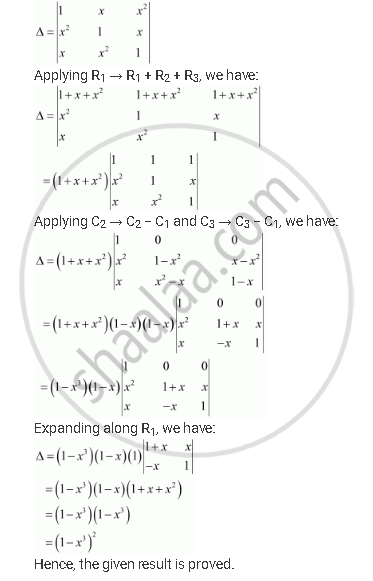Advertisements
Advertisements
प्रश्न
By using properties of determinants, show that:
`|(1,x,x^2),(x^2,1,x),(x,x^2,1)| = (1-x^3)^2`
उत्तर

APPEARS IN
संबंधित प्रश्न
Using properties of determinants, prove that `|[2y,y-z-x,2y],[2z,2z,z-x-y],[x-y-z,2x,2x]|=(x+y+z)^3`
Using properties of determinants prove the following: `|[1,x,x^2],[x^2,1,x],[x,x^2,1]|=(1-x^3)^2`
Using properties of determinants, prove that
`|[x+y,x,x],[5x+4y,4x,2x],[10x+8y,8x,3x]|=x^3`
By using properties of determinants, show that:
`|(0,a, -b),(-a,0, -c),(b, c,0)| = 0`
Without expanding the determinant, prove that
`|(a, a^2,bc),(b,b^2, ca),(c, c^2,ab)| = |(1, a^2, a^3),(1, b^2, b^3),(1, c^2, c^3)|`
Evaluate `|(1,x,y),(1,x+y,y),(1,x,x+y)|`
Using properties of determinants, prove that:
`|(alpha, alpha^2,beta+gamma),(beta, beta^2, gamma+alpha),(gamma, gamma^2, alpha+beta)|` = (β – γ) (γ – α) (α – β) (α + β + γ)
Using properties of determinants, prove the following:
Using properties of determinants, prove that:
`|[a^2 + 1, ab, ac], [ba, b^2 + 1, bc ], [ca, cb, c^2+1]| = a^2 + b^2 + c^2 + 1`
Solve for x : `|("a"+"x","a"-"x","a"-"x"),("a"-"x","a"+"x","a"-"x"),("a"-"x","a"-"x","a"+"x")| = 0`, using properties of determinants.
Find the value (s) of x, if `|(1, 4, 20),(1, -2, -5),(1, 2x, 5x^2)|` = 0
Find the value (s) of x, if `|(1, 2x, 4x),(1, 4, 16),(1, 1, 1)|` = 0
Without expanding the determinants, show that `|(x"a", y"b", z"c"),("a"^2, "b"^2, "c"^2),(1, 1, 1)| = |(x, y, z),("a", "b", "c"),("bc", "ca", "ab")|`
Without expanding evaluate the following determinant:
`|(2, 3, 4),(5, 6, 8),(6x, 9x, 12x)|`
Without expanding evaluate the following determinant:
`|(2, 7, 65),(3, 8, 75),(5, 9, 86)|`
Solve the following equation:
`|(x + 2, x + 6, x - 1),(x + 6, x - 1, x + 2),(x - 1, x + 2, x + 6)|` = 0
Without expanding determinants show that
`|(1, 3, 6),(6, 1, 4),(3, 7, 12)| + 4|(2, 3, 3),(2, 1, 2),(1, 7, 6)| = 10|(1, 2, 1),(3, 1, 7),(3, 2, 6)|`
Select the correct option from the given alternatives:
The system 3x – y + 4z = 3, x + 2y – 3z = –2 and 6x + 5y + λz = –3 has at least one Solution when
Select the correct option from the given alternatives:
If x = –9 is a root of `|(x, 3, 7),(2, x, 2),(7, 6, x)|` = 0 has other two roots are
Select the correct option from the given alternatives:
If `|(6"i", -3"i", 1),(4, 3"i", -1),(20, 3, "i")|` = x + iy then
If `[(4 - x, 4 + x, 4 + x),(4 + x, 4 - x, 4 + x),(4 + x, 4 + x, 4 - x)]` = 0, then find values of x.
If A, B and C are angles of a triangle, then the determinant `|(-1, cos"C", cos"B"),(cos"C", -1, cos"A"),(cos"B", cos"A", -1)|` is equal to ______.
If x = – 9 is a root of `|(x, 3, 7),(2, x, 2),(7, 6, x)|` = 0, then other two roots are ______.
`|(x + 1, x + 2, x + "a"),(x + 2, x + 3, x + "b"),(x + 3, x + 4, x + "c")|` = 0, where a, b, c are in A.P.
If `abs ((2"x",5),(8, "x")) = abs ((6,-2),(7,3)),` then the value of x is ____________.
Let P be any non-empty set containing p elements. Then, what is the number of relations on P?
If the ratio of the H.M. and GM. between two numbers a and bis 4 : 5, then a: b is
In a third order matrix B, bij denotes the element in the ith row and jth column. If
bij = 0 for i = j
= 1 for > j
= – 1 for i < j
Then the matrix is
If f(α) = `[(cosα, -sinα, 0),(sinα, cosα, 0),(0, 0, 1)]`, prove that f(α) . f(– β) = f(α – β).
If `|(α, 3, 4),(1, 2, 1),(1, 4, 1)|` = 0, then the value of α is ______.
By using properties of determinant prove that
`|(x+ y,y+z, z+x ),(z, x,y),(1,1,1)|` = 0
Without expanding determinants find the value of `|(10, 57, 107),(12, 64, 124),(15, 78, 153)|`
Evaluate the following determinant without expanding:
`|(5, 5, 5),(a, b, c),(b + c, c + a, a + b)|`
Without expanding evaluate the following determinant:
`|(1, a, b + c), (1, b, c + a), (1, c, a + b)|`
By using properties of determinant prove that `|(x+y,y+z,z+x),(z,x,y),(1,1,1)|=0`
Without expanding evaluate the following determinant.
`|(1,"a","b+c"),(1,"b","c+a"),(1,"c","a+b")|`
Without expanding evaluate the following determinant.
`|(1, a, b+c),(1, b, c+a),(1, c, a+b)|`
Without expanding evaluate the following determinant.
`|(1, a, b + c),(1, b, c + a),(1, c, a + b)|`
